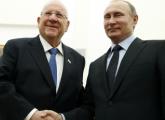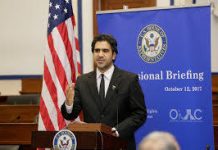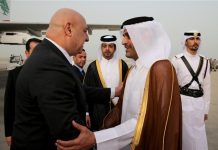Putin meets Rivlin at Kremlin amid Russia’s Syria disengagement
Jerusalem Post/March 16/16
At the start of his meeting on Wednesday at the Kremlin with President Reuven Rivlin, Russian President Vladimir Putin, stressed his country’s historic ties with Israel.”Honored president, I welcome you with all my heart on your arrival to Russia. There are over 1.5 million people from the Former Soviet Union living in Israel, Russian speaking people who have both Russian culture and the Russian mentality,” Putin said. The Russian president said that the Israelis from the FSU that live in Israel maintain ties to family and friends in their native lands, and that these ties give a “unique flavor to the relations” between Israel and those countries. Officials from both countries said Tuesday that Israel was consulting with Moscow over its unexpected decision to return home the bulk of Russian troops in Syria, possibly complicating a mechanism to coordinate military action agreed upon by the two countries last fall. “We have many topics to discuss in our meeting,” Putin said. The Russian president added that he had also spoken to Prime Minister Benjamin Netanyahu and the two set a time for further discussions. Rivlin also stressed the quality of Israeli-Russian relations. “The Russian-Israeli relationship has a long history. We cooperate in many different area and we both have experience in dealing with terror and fundamentalism,” Rivlin said. “As a Jew, I want to say, we will never forget the Russian nation and the Red Army’s victory over the Nazis. Many Holocaust survivors in the world will never forget that the first soldier they meet at liberation was a Red Army Soldier,” Rivlin said. Russia’s military intervention in Syria last year on behalf of its embattled Alawite president, Bashar Assad, originally concerned Jerusalem, which routinely conducts covert raids into Syrian territory in order to disrupt shipments of Iranian arms and missiles to Lebanese Hezbollah. But in October, Russia and Israel agreed on methods of communicating that would allow Israel’s defense operations to continue. Russia’s deputy ambassador to Israel, Alexey Drobinin, said the two governments have an “ongoing dialogue” on both the military and diplomatic levels, specifically regarding Syria operations. Those channels of communication will remain open, he said. Rivlin was expected to seek an understanding of how Moscow envisions the future of Syria in his meeting with Putin. “There is a need for coordination with Russia regarding the current situation,” Rivlin told reporters en route to Russia on Tuesday. “Everyone understands that Islamic State is a danger to the entire world, but the Shi’ite fundamentalist Islam of Iran is for us no less a threat,” One senior Israeli official said Israel does not understand what was behind Putin’s surprise announcement. According to the official, the central goal of Rivlin’s talks with Putin will be to discuss the day after Syria’s civil war ends and the efforts in Geneva to negotiate a political solution to the ongoing crisis.
US criticizes Israel for ‘land seizure’
Reuters/Ynetnews/Published: 03.16.16/State Department spokesman John Kirby says ‘we strongly oppose any steps that accelerate settlement expansion, which raises serious questions about Israel’s long-term intentions. The U.S. State Department Tuesday criticized Israel for appropriating large tracts of land in the West Bank near the Dead Sea and the city of Jericho, as reported by Israeli Army Radio. The State Department said that ongoing expropriations and settlement expansions were “fundamentally undermining the prospects for a two-state solution.””We strongly oppose any steps that accelerate settlement expansion, which raises serious questions about Israel’s long-term intentions,” State Department spokesman John Kirby told a news briefing. Israel’s Peace Now movement, which tracks and opposes Israeli settlement in territory captured in a 1967 war, said the reported seizure of 579 acres (234 hectares) represented the largest land confiscation in the West Bank in recent years. The group said plans for expanding nearby Jewish settlements and building tourism and other commercial facilities in the area were already on Israel’s drawing board. Palestinian chief negotiator Saeb Erekat, in a statement, called on the international community to press Israel to stop land confiscations. Most countries view Israeli settlement activity in the West Bank and East Jerusalem as illegal and an obstacle to peace. Asked about Army Radio’s report of the land confiscation, Israeli Defence Minister Moshe Yaalon’s office said in an email to Reuters: “We are not relating to the issue.”Photos of a de facto Israeli confiscation notice – a Hebrew map and accompanying documents titled “A declaration of government property” – were tweeted, however, by the Palestine Liberation Organization on Tuesday. Dated March 10, it listed 2,342 dunams, or 579 acres, and carried the signature of an official identified on the map as Israel’s “supervisor of government property and abandoned property in Judea and Samaria”, Hebrew terms for the West Bank. Israel says it intends to keep large settlement blocs in any future peace agreement with the Palestinians. Palestinians, who seek to establish a state in the West Bank and Gaza Strip, say they fear Israeli settlement expansion will deny them a viable country.
Egypt and Israel: Peace but not peaceful
Yossi Mekelberg/Al Arabiya/March 16/16
One doubts whether Tawfik Okasha, an Egyptian lawmaker, could have expected that an invitation to Israeli Ambassador Haim Koren, for dinner at his home would stir up such political commotion among his country’s media and parliament. Let alone, he could hardly have predicted that a photo of this minor event, posted by the Israeli embassy on Facebook, would lead to having a shoe hurled at him by another legislator, and a dismissal from the Egyptian parliament. Mr. Okasha is no stranger to controversy, in both his TV career and as parliamentarian, nevertheless, those who scolded Mr. Okasha, barely had any details regarding the nature of the conversation between the Israeli envoy and the Egyptian politician. This incident could have been dismissed as a storm in the Egyptian domestic political teacup, had it not exemplified the relations between Israel and Egypt since they signed a peace agreement in 1979.
President Sadat’s historic visit to Jerusalem in 1977 and the ensuing peace agreement with Israel, could and should have also been the beginning of the end of the Arab-Israeli conflict. However, from the outset it lacked a number of key ingredients that are still absent, preventing this peace agreement, landmark as it was, from translating into fully-fledged relations between the two neighbouring countries, or a regional turning point.
Without belittling the momentous achievement of bringing an end to the state of war between these two major regional powers, their relations since then are based on a commonality of strategic interests, without bringing together the people of both countries to overcome decades of enmity.
The most obvious element missing from the Camp David accords was a genuine effort to also address the Palestinian issue. This has been a source of much anger in Egypt and elsewhere in the Arab world ever since. Palestinians and their plight were an ‘inconvenience’ for President Sadat and Israeli Prime Minister Menachem Begin in the process of negotiating peace between their two countries. They feared that by adding the Palestinian issue they would never be able to resolve their differences. By paying no more than lip service to the right of Palestinians for self-determination in the Camp David accords, Israel and Egypt have sown the seeds of a cold and incomplete peace.Furthermore, they failed to adequately address the heart of the Arab-Israeli conflict. This approach might have paid a short-term dividend, but it has contributed to many years of strife between the Israelis and Palestinians. It has also made it harder to bring many ordinary Egyptians and the rest of the Arab world on board of the peace journey.
The cold peace
Admittedly, this was not the only reason for the cold peace between Israel and Egypt. There were also elements in Egypt among the political and intellectual elite, the media and the Islamist movement, that never came to terms with a separate peace with the Jewish state. A significant number of them feared Egyptian isolation in the Arab world and for its loss of a leadership role within the region. Others simply could not accept Israel as an integral part of the Middle East, and sadly aside from legitimate criticism of Israeli policies, also appeared in some quarters of the media espousing anti-Semitic expressions.
Yet, Israeli behavior since peace was reached with Egypt, put severe strains on diplomatic relations between the two countries for a very long time. The oppressive occupation in the West Bank and Gaza, and the two wars in Lebanon, for instance, constantly threatened the ability of Egypt to maintain peace with Israel, and made it almost impossible for Egyptian-Israeli relations to go beyond a rather cold peace. Despite all of the above-mentioned pitfalls, the peace agreement has held and strategic cooperation became even closer, especially following the ousting of the Muslim Brotherhood from power by the military in July of 2013. Strategic cooperation between Egypt and Israel since General Abdel Fattah el-Sisi became president has reached new heights. Both governments in Cairo and Jerusalem share a common uncompromising approach to everything they perceive as militant Islam. The need to contain emerging Jihadist structures in the Sinai Peninsula, and restore law and order there became an imperative for both governments, as it poses a danger to both.
The oppressive occupation in the West Bank and Gaza, and the two wars in Lebanon, constantly threatened Egypt’s ability to maintain peace with Israel, and impossible for the relations to go beyond a rather cold peace
There is a real fear that ISIS-type organisations are taking hold in the lawless environment of the Sinai, which if uncontained might spiral out of control. Moreover, both Israeli and Egyptian governments see the Hamas movement as a sworn enemy.
For Israel, it is in the context of the conflict with the Palestinians, especially Gaza, and for Egypt it is related to the antagonism towards the Muslim Brotherhood and the chaotic situation in the Sinai. Consequently, both countries have tightened the blockade on Gaza, preventing the smuggling of weapons and depriving the Hamas from revenue. Tragically and unacceptably this is also deepening the misery of the Gazan people’s daily life.For the foreseeable future, as Egypt and Israel’s neighboring countries are enduring deep turmoil and militant Islam poses a threat, both countries prioritise mutual collaboration to ward off these threats adversely affecting their countries. Regrettably, as ever, they are doing so using solely military means, and not dealing with the root causes of the rise of this phenomenon. In the meantime they also neglect the opening of a comprehensive dialog between the societies, which will put more substance into their relations beyond the military one. Until then the peace is left to survive on very thin ice.





















